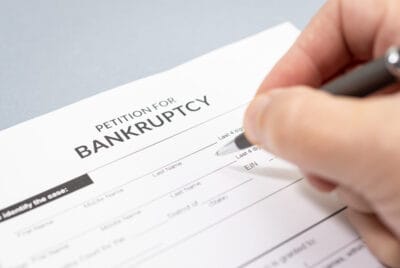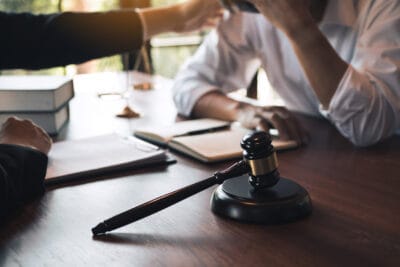
The Short Answer…
Criminal charges against the person who caused your injury can significantly impact your personal injury claim. If that person is found guilty of a criminal charge, it can strengthen your case by providing compelling evidence of their negligence. A civil court may treat that conviction as proof of fault under the legal doctrine of negligence per se, making it easier to win compensation. Even if there’s no conviction, the existence of criminal charges can still support your case. If the defendant in your personal injury case is facing criminal charges, read on to learn more about how your personal injury case may be affected.
Key Takeaways
- A criminal conviction can simplify your civil case. Courts may accept a guilty verdict as automatic proof of negligence, reducing your burden of proof.
- You may be entitled to more compensation. Convictions for serious wrongdoing can lead to punitive damages in addition to compensation for medical bills, lost income, and suffering.
- The cases are separate but related. Criminal and civil proceedings are distinct, but evidence from the criminal case can impact your civil lawsuit.
- You can still sue without a conviction. Even if the defendant is not charged or is acquitted, you may still recover damages in civil court using a lower burden of proof.
- Legal representation is essential. A personal injury lawyer can use evidence from the criminal proceedings to build a stronger civil case on your behalf.
Criminal Charges Provide Proof of Liability
Criminal charges against the defendant in your personal injury case may provide proof of liability, which can be applied to your personal injury case. This means if the defendant is criminally charged (for DUI or assault, for example), those charges can serve as evidence in your personal injury case that they are liable for your injuries. The criminal conviction may serve as proof that the defendant was at fault due to the principle of “negligence per se.” This means that the criminal act is considered inherently negligent, simplifying your burden of proving liability in the civil case.
How Criminal Charges Impact Your Personal Injury Claim
Aside from criminal charges providing proof of liability in your personal injury case, they may affect how your case proceeds in a variety of other ways, as well.
Impact on Damages
A criminal conviction of the defendant can influence the amount of damages you may be awarded, particularly punitive damages. In West Virginia, punitive damages can be awarded in civil cases where the defendant’s actions were malicious, fraudulent, or reckless. A criminal conviction can support a claim for punitive damages by demonstrating that the defendant’s behavior was egregious.
Impact on Settlement
Defendants who are facing criminal charges might be more motivated to settle the civil case to avoid further legal complications or public scrutiny. This could potentially lead to a quicker or more favorable settlement for the plaintiff.
Impact on Statute of Limitations
In West Virginia, the statute of limitations for personal injury cases is typically 2 years from the date of the injury. However, criminal charges against the defendant could potentially pause or extend this timeframe.
For example, if the defendant is incarcerated or otherwise unable to participate in legal proceedings due to the criminal case, the statute of limitations may be extended.
Delay in Civil Proceedings
If there are ongoing criminal proceedings, the civil case might be delayed until the conclusion of the criminal case. Courts often prefer to wait on the outcome of the criminal trial as it can significantly affect the civil proceedings.
Insurance Considerations
If the defendant’s actions leading to the personal injury were criminal, their insurance company might deny coverage for the incident. This could affect the defendant’s ability to pay any awarded damages unless they have personal assets sufficient to cover the judgment.
Crimes That Can Impact a Personal Injury Lawsuit
Certain crimes can impact a personal injury claim by affecting the credibility of the parties involved or altering liability. These include:
- DUI/DWI
- Reckless driving
- Fraud
- Assault
- Theft or robbery
Understanding how these crimes interact with personal injury law is critical for assessing the implications for both liability and compensation in such cases. A personal injury lawyer can help you understand these legal intricacies.
What Happens When the Defendant Is Guilty?
If a defendant is found guilty in a personal injury case, it means that they are legally responsible for the harm caused to the plaintiff. The damages awarded, payment arrangements, appeal process, collection of judgment, and insurance involvement are a few examples of how the defendant is held accountable for his or her actions in a personal injury case.
First, the court will determine the amount of compensation that the defendant must pay to the plaintiff. This can include compensatory damages for medical expenses, lost wages, pain and suffering, and sometimes punitive damages if the defendant’s actions were particularly reckless or intentional.
The court might also outline specific payment arrangements for the defendant to pay the awarded damages to the plaintiff. This could be in the form of a lump sum or structured payments. Also, if the defendant believes there was a legal error in how the trial was conducted or if they dispute the judgment, he or she could appeal the verdict.
Another way a defendant is held responsible for his or her actions is the collection of judgment. If he or she does not voluntarily pay the awarded damages, the plaintiff may need to take further legal steps to collect the judgment. This could involve garnishing wages, seizing assets, or placing liens on property. If the defendant has liability insurance, the insurance company may pay all or part of the damages on behalf of the defendant, up to the policy’s coverage limits.
Being “found guilty” in the context of a civil personal injury case is different from criminal guilt. In civil cases, the terminology would be more accurately described as the defendant being “found liable” for damages. Contact Stewart Bell today to learn more about how criminal charges affect your personal injury case.
Proving Liability With a Not-Guilty Defendant
Although it can be difficult to prove liability with a not-guilty defendant in a related criminal trial, it is possible given the different burdens of proof required in civil versus criminal cases.
In criminal cases, the burden of proof is “beyond a reasonable doubt,” which is much higher than in civil cases, where the standard is “preponderance of the evidence.” In a civil case, you only need to prove that it is more likely than not that the defendant was liable.
- Gather Comprehensive Evidence: Collect as much evidence as possible to support your claim. This includes:
- Physical evidence from the accident scene, such as damaged property.
- Eyewitness testimonies who can speak to the circumstances of the incident.
- Photos and videos from the scene to document conditions and impact.
- Medical records that detail the injuries suffered and link them directly to the accident.
- Police reports and any other official documents filed in relation to the incident.
- Use Effective Legal Strategy: Working with a skilled personal injury attorney is critical. They can help navigate the complexities of civil litigation, develop a strategy to effectively present your case, and handle procedural matters that could impact the outcome.
- Demonstrate Negligence: Establish that the defendant owed a duty of care, breached that duty, and directly caused your injuries as a result. Negligence does not need to be proven to the extent of criminal wrongdoing but must connect the defendant’s actions to your injuries.
- Consider Settlement Options: If the defendant offers a settlement, evaluate whether it adequately compensates for your damages and losses. Negotiation might be a pragmatic approach to secure compensation without the uncertainties of a trial.
Each case is unique, and the ability to successfully claim liability against a defendant found not guilty in criminal court depends heavily on the specifics of the individual case and the quality of evidence available. Contact Stewart Bell today for a free case review.
Contact Stewart Bell Today
With over four decades of experience, the personal injury lawyers at Stewart Bell, PLLC have dedicated themselves to representing the interests of injury victims across Charleston, Dunbar, Huntington, and other areas in West Virginia. We do not require any upfront fees to begin working with you on your case.
Navigating the relationship between criminal charges and a personal injury case can be complex, and you can benefit from legal guidance to understand the specific implications for your situation. Reach out to Stewart Bell, PLLC, to learn how criminal charges affect your personal injury case.





